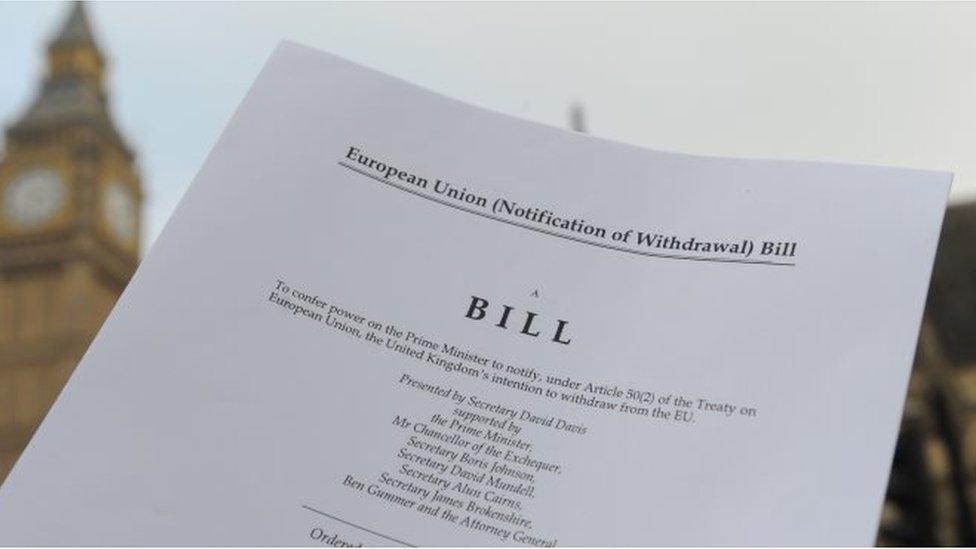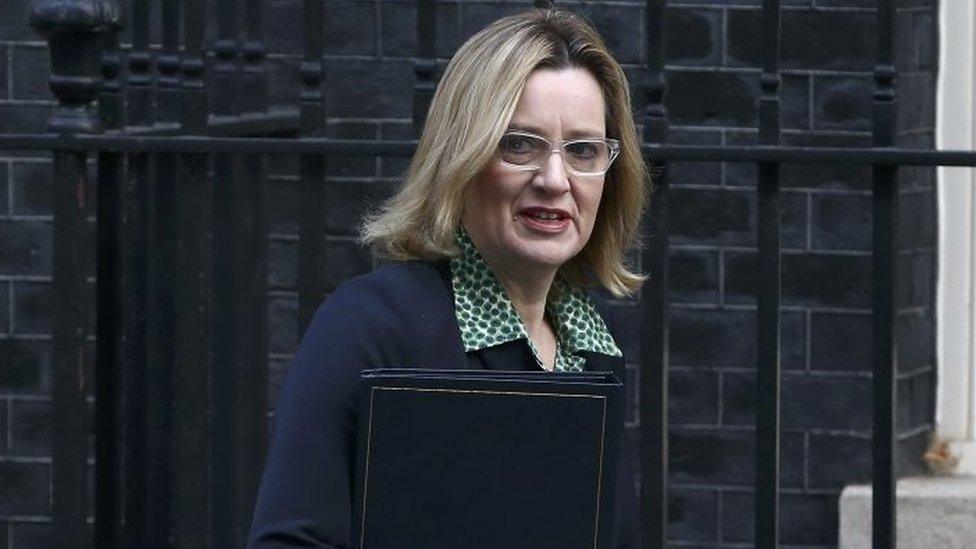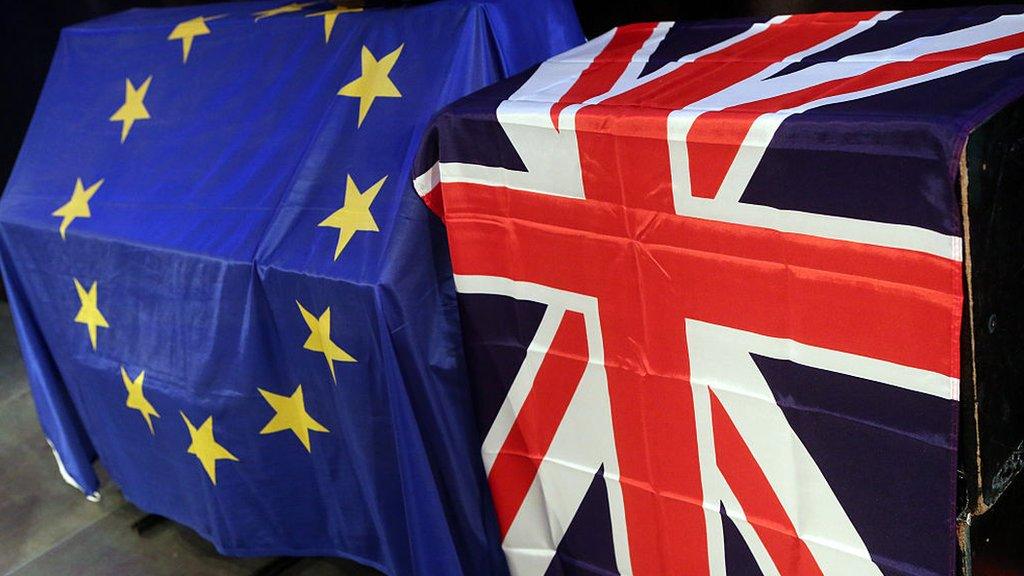Week ahead
- Published
- comments

Apocalypse now, or damp squib? Next week, the work of Westminster will be dominated by the bill, mandated by the Supreme Court, to give parliamentary authority to trigger the formal process of British withdrawal from the EU.
The considerable rarity of a two-day second reading debate, followed the following week by three days of committee of the whole House, to process a two-clause 137 word bill, external may seem like overkill, but there are already complaints that insufficient time has been allocated.
Unusually, MPs were allowed to put down amendments even before the second reading debate, external, and they were queuing up at the Table in the Commons, the moment business ended on Thursday.
The SNP promises 50 amendments; a series of pro-EU Labour MPs like former shadow Chancellor Chris Leslie have put down amendments of their own; the Chair of the Joint Committee on Human Rights Committee, Harriet Harman, has put down an amendment calling for the "continuation of those residence rights enjoyed by EU citizens lawfully resident in the United Kingdom on 23 June 2016".
And, of course, the Green co-Leader, Caroline Lucas, has a second reading amendment to block the whole bill, on the grounds that it is "premature" to trigger Article 50 of the Lisbon Treaty.
There may be procedural battles too; on the Remain side they dismiss the two day second reading debate as an exercise in soaking up debating time which would be better used on detailed committee stage consideration, so they may seek to re-write the Programme Motion allocating the debating time for the bill. The votes will be interesting - on the Conservative side fireworks seem unlikely - but a number of Labour frontbenchers are deeply unhappy at being required to vote for the bill. Some may resign, some already have, and if others vote against, or abstain, without being disciplined, the authority of the leadership will suffer.
As for this week's other business ("but apart from that, Mrs Lincoln, how did you enjoy the play...?") watch out for the last rites on the bill to authorise the first stage of HS2.
Here's my rundown of the week ahead:
Monday
The Commons opens (2.30pm) with an hour of Defence questions - and, as usual any ministerial statements or urgent questions normally follow at 3.30pm.
Then MPs will turn to the second reading of the Pension Schemes Bill - which has already cleared the House of Lords. This aims to protect savers and maintain their confidence in pension savings, and the main focus is on regulating master trust occupational pension schemes, which have become a most popular vehicle into which workers are automatically enrolled, particularly among small employers.
In Westminster Hall (4.30pm) MPs will debate E-petition 168127, external relating to pay restraint for Agenda for Change NHS staff - these including nursing, midwifery, healthcare assistants and other healthcare professionals. The petition complains that they have suffered a 14% cut in real terms pay, and many have been pushed into poverty.
Committee of the day is the Work and Pensions hearing (3.45pm) on the Victims of Modern Slavery with ministers Damian Hinds and Sarah Newton.
In the Lords (2.30pm), peers will be told the dates for their consideration of the Article 50 Bill - it's rumoured the second reading is pencilled in for Monday 20 February - but for today the main event is the continuing committee stage debate Higher Education and Research Bill, external. Key issues are the research aspects of the bill, including the functions of UK Research and Innovation, the make-up of the research councils, and the Haldane principle - the idea that decisions about how to spend research funds on should be made by researchers rather than politicians.
Tuesday
MPs open (11.30am) with Business, Energy and Industrial Strategy questions. Then there's an interesting Ten Minute Rule Bill from the Conservative, Nusrat Ghani, a member of the Commons Home Affairs Committee. She wants to ban the use of the term "honour killing" in official publications; and to require the government to help women who are British citizens who suffer aggravated violence abroad. This would include organising and paying for the repatriation of the bodies of women who have been murdered, and prosecuting perpetrators who are UK citizens for these offences, even if committed in other countries.
But the main event, inevitably, is the first day of second reading debate on the European Union (Notification of Withdrawal) Bill, external (see above). The Green MP Caroline Lucas and the SNP's Brexit spokesperson Stephen Gethins have an amendment to deny a second reading, and there's a second amendment signed by the SNP leadership, plus MPs from Plaid Cymru and the SDLP, which has the same effect. Mr Speaker will decide which, if any, are debated.
In Westminster Hall, my eye was caught by the debate (4.30pm-5.30pm) on statutory sex and relationships education in all government-funded schools, to be led by Labour's Diana Johnson. This is a subject that keeps coming up - suggesting strong parliamentary pressure for a change in the law.

The home secretary will be answering questions at the Home Affairs Committee on Tuesday
My committee pick is the Home Affairs hearing (4pm) with the Home Secretary Amber Rudd.
In the Lords (2.30pm) peers have questions; then the third reading debate on the High Speed Rail (London-West Midlands) Bill, external, the end point of three and a half years of painstaking parliamentary work in Lords and Commons. The Conservative peer Lord Framlingham (the former deputy Speaker of the Commons, Michael Lord) has a fatal motion down to stop the bill at this final fence. It may be forced to a vote, but it is unlikely to succeed.
This is followed by the first committee day of the Digital Economy Bill, external - where the main issues will be broadband and the Universal Service Obligation, switching communications providers, and the electronic communications code. There will also be a short debate on improving neurological services in England.
Wednesday
The Commons meets (at 11.30am) for Northern Ireland questions, followed at noon by Prime Minister's questions.
Next comes a Ten Minute Rule Bill from the Conservative Peter Aldous, calling for the publication of tax information on fuel bills - he argues that UK Fuel Duty is one of the most punitive taxes in the world and is collected by stealth, and that the government hides how much of this levy it takes, every time 37 million drivers fill up their vehicles. He says there is an obligation for government to be open with UK drivers on the tax they're paying.
Then MPs return to the European Union (Notification of Withdrawal) Bill - and watch out not only for the vote on the second reading itself, but also for the vote on the programme motion, external - which might provide a way for MPs who don't quite dare oppose the bill itself to let off some steam.
In Westminster Hall, my eye was caught by Kate Green's debate on outcomes for gypsies and travellers in the youth justice system (11am-11.30am) and Lucy Allan's on the implementation of the Prevent strategy (2.30pm -4pm).
My committee pick is the Brexit Committee hearing (9.15am) on immigration policy and Brexit - with David Goodhart, Head of the Demography, Immigration, and Integration Unit, at the think-tank Policy Exchange; Sunder Katwala of British Future, and Jonathan Portes, Professor of Economics and Public Policy, King's College London.
In the Lords (3pm) the main legislating is on the Technical and Further Education Bill, external, which aims to boost the quality of technical education and the standing of the qualifications it awards. And there is also a short debate on government progress in discussions with other Nato countries about ensuring that member states commit to spending 2% of GDP on defence - led by Labour former minister Lord Touhig.
Thursday
In the Commons (from 9.30am) MPs have a chance to question the Attorney General and the minister for Women and Equalities - and then comes the weekly statement setting out the forthcoming agenda for the Commons, from the Leader of the House, David Lidington.
The rest of the day is devoted to subjects chosen by the Backbench Business Committee - there will be a short statement from the Chair of the Public Administration and Constitution Committee, Bernard Jenkin, on their latest report, 'Will the NHS ever learn?' - and then there will be a general debate on the Armed Forces Covenant Report 2016, led by the Conservative, Anne-Marie Trevelyan.
In Westminster Hall (from 1.30pm) there's a debate on tackling alcohol harm.
In the Lords (11am) the main event is the second day of committee stage consideration on the Digital Economy Bill: the key issues include online pornography, the age verification regulator, and intellectual property. Dinner break business is a debate on the impact on disabled people of the UK's withdrawal from the EU.
Friday
In the Commons (9.30am), the day is devoted to consideration of private members' bills - but the agenda is a little uncertain, because the top spot will be taken by any bill which has emerged from committee stage. Lurking further down the running order are second readings for such bills as Dan Jarvis's Child Poverty in the UK (Target for Reduction) Bill, external, and Wendy Morton's Local Authority Roads (Wildlife Protection) Bill, external. These may, or may not, be debated.
In the Lords (10am) the Labour peer Lord Hunt of Kings Heath has the second reading debate on his Regulation of Health and Social Care Professions Etc. Bill, external. Then comes Baroness McIntosh of Pickering's Child Contact Centres (Accreditation) Bill, external and the Green Party peer, Baroness Jones of Moulsecoomb's House of Lords Reform Bill, external, which proposes excluding the hereditary peers and creating an elected chamber.
- Published30 December 2020

- Published28 March 2017

